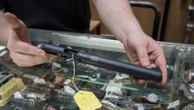Tales of turning water into wine or weaving straw into gold are one thing, but a new study shows that scientists can transform trash into . . . Tylenol?
Scientists at the University of Edinburgh were able to convert plastic waste into paracetamol, aka acetaminophen, the active ingredient in the pain reliever Tylenol. Stranger yet, they pulled off the alchemical feat using the bacteria E. coli.
“We’re able to transform a prolific environmental and societal waste into such a globally important medication in a way that’s completely impossible, using chemistry alone or using biology alone,” says study coauthor Stephen Wallace, a chemical biotechnologist at the University of Edinburgh in Scotland.
The research team began with polyethylene terephthalate (PET), a common plastic found in food packaging and polyester clothing. Using established chemical methods, they broke down the PET plastic into a precursor molecule and then added it into a cell culture of E. coli that was genetically modified.
Enzymes in the modified E. coli bacteria were able to convert the plastic precursor into paracetamol 92% of the time. The transformation relies on a chemical process known as a Lossen rearrangement, which can convert one kind of molecule into a different kind of molecule. Scientists have known about the Lossen rearrangement for more than 100 years, but generally observe the phenomenon in a flask or a test tube.
The research group is now working with pharmaceutical makers including AstraZeneca, one of the study’s sponsors, to replicate the same chemical transformations on a larger scale.
The new research isn’t the first to observe the way that bacteria can be deployed to usefully break down plastic. Researchers have previously studied how wastewater bacteria found in urban waterways use a special enzyme to chew up plastic trash and convert it into carbon-based food.
As we grapple with the cascading environmental and health effects that decades of proliferating plastics have wrought on the planet, bacteria capable of converting plastic into harmless or even useful molecules is a promising area of research.










No comments